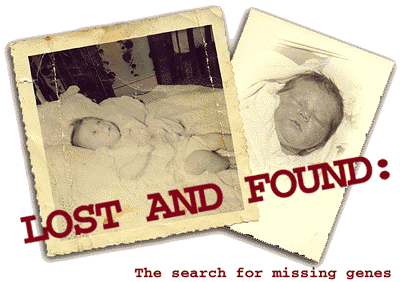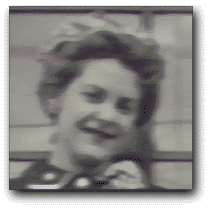
 by Brian Fuld
Birth Mothers seek their lost children. Sound familiar? If so, read on...
In 1982 a small book, The Selfish Gene, was quietly published and largely forgotten. In it, author Richard Dawkins made an amazing observation. Some scholars now believe his theories about our genes may rival that of Darwin's theory of evolution.
In Darwin's theory, all life seeks to continue despite the changes in environment. It does this by perpetuating small changes in each copy of its offspring. Sometimes these subtle changes, like having a slightly longer neck, provide the animal with the extra reach to obtain more food, and the change continues until we have, perhaps a giraffe, who can graze on leaves that other animals cannot reach. Darwin suggested that our bodies, and those of every animal and plant, were shaped by adaptation to competition and environmental change. Dawkins, in The Selfish Gene, took this one step further.
To Dawkins, the gene itself is the primary unit seeking continuation, not the organism in which it resides. To him, our bodies are merely convenient vehicles created by the genes to allow them to meet, recognize and selectively join with other genes. In fact, Dawkins suggested, the phenomenon of life itself can be thought of as a contrivance of these complex molecules to perpetuate their unique sequences!
Dawkins used examples of altruism (sacrificing one's self or safety) which is strongest among genetic siblings. A brother or mother will easily put their life in danger- even lose it- to save a genetic family member. This action is almost automatic and instinctive but diminishes as the family relationship becomes less distinct.
Further evidence for the importance of genetic altruism can be seen in the often painful and exhaustive efforts that both adopted children and their birth parents expend to locate each other. It's often a quest that only the brave ever achieve.
In the early part of this century, thousands of young women became pregnant out of wedlock and were persuaded to give up their new-borns to adoption agencies. A majority of both adoptees and their biological parents grew up to have families of their own and the "sins" of their youth were forgotten. Almost.
Statistics show that one in ten of us is part of a family relationship that involves an adopted or non-genetically related individual. This is a large number. With the majority of adoptees coming into adulthood, there is a deeply emotional need to be reunited. This need is often frustrated by old State laws, instituted decades ago, designed to protect the identity of both parent and child from future knowledge of each other. The frustration can sometimes be just too much to handle.
Tamara is a 57 year old married mother of two daughters. Her search for a lost child is made all the more urgent by her recent diagnosis of terminal lung disease. She is now focused on the one unresolved mystery of her life: the whereabouts and happiness of her daughter.
"I became pregnant back in the early 1960's when I was dating a guy in high school. Back then it was a big disgrace and my family sent me away to deliver the baby at a so-called 'home for wayward girls' in Ohio. When I delivered the baby, she was taken away and placed in a home and I never even got a chance to see or hold her. She would be 32 years old now and probably has children of her own. I married years later and had another daughter with whom I am closely attached. One day, I told my daughter about her half-sister and she became very excited and wanted to help locate our missing family member. We have tried every avenue and have even spent thousands of dollars on detectives and search agencies but to no avail. We feel a loss and we will not rest until we find her..."But not all stories are unresolved. Often the adopted children themselves are the most eager and persistent to find their birth mothers.
"I found out when I was 19 years of age that I was adopted. My parents sat me down and told me what they knew about my birth mother. Which wasn't much! They told me that if I wanted to search for my birth mother that they would support me all the way. I wasn't quite sure how to go about doing this so I went on-line to find some help. I was kindly directed to a lady who is a Confidential Intermediary. She basically is the go-between the court system, me and my birth mother. My Parent's gave me the money necessary to begin the search. It took 4 months from the time of petitioning the Courts and locating my birth mother. I spoke to the woman who gave birth to me 25 years ago for the first time in October of 1995.The location of missing siblings and birth mothers is a complex business but, with the assistance of the internet, this is becoming easier. Viewzone asked one successful adoptee to describe the process.
Viewzone: Is it always the case that these issues are resolved through the confidential intermediary? or are there other ways? |
|
Sometimes, locating a birth mother or adoptee is a matter of life and death. Certain rare genetic diseases and the need for compatible donors of bone marrow in cancer cases have caused numerous problems with the confidentiality laws. These laws, initially enacted to protect the sensitive nature of these separations seem invariably to be hindering a basic biological necessity that lies deep with our being- the need to be near and to have knowledge of one's own gene pool. In reading the stories and speaking to numerous adoptees who had located their birth mothers, we heard descriptions of emotions such as feelings of "absolute love," "like a part of myself was given back to me" and "feeling happy for the first time ever in a true and clear way..." Obviously this is quite an emotional catharsis. We also heard descriptions of surprise at the similarities that reunited adoptees noticed in behaviors, preferences for food and novels, and any number of other interests not usually attributed to genes. These subtle similarities have only genetics as a common factor. Dawkins, in his book, The Selfish Gene, called these odd little characteristics "memes" and believes that these memes serve as the basis of our compatibility (or incompatibility) with others of our species. In short, it's a kind of genetic basis for culture. A preference for Dr. Pepper or anchovies may have more significance to your genes than we would like to believe. Such "memes" may, to our genes, be like the secret handshake or the lapel pin of a politician, indicating that the organism is "one of us." Much more attention needs to be given to the genetic preferences and especially to the need for like genes to associate and celebrate their similarities. Laws and cultural inhibitions against reuniting adopted children with their biological parents clearly inhibits this natural drive.
|
 As many of these adopted children reach adulthood, they are finally told what they had perhaps suspected -- that they were not biologically related to "Mom" and "Dad." For some, this matters little. The strong bonds of trust and years of affection will never diminish the deep love that each feels towards the other. Others take this news as confirming something that they have always felt- an sense of being "incomplete" or different. These feelings eventually trigger the long search for their genetic family.
As many of these adopted children reach adulthood, they are finally told what they had perhaps suspected -- that they were not biologically related to "Mom" and "Dad." For some, this matters little. The strong bonds of trust and years of affection will never diminish the deep love that each feels towards the other. Others take this news as confirming something that they have always felt- an sense of being "incomplete" or different. These feelings eventually trigger the long search for their genetic family.